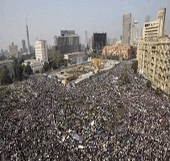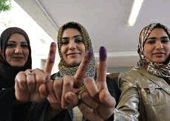Egypt
Published on Mon, 2011-06-13 10:26
Sources Twenty Egyptian civil society organisations are looking at the Tunisian example to recommend giving priority to the draft of the Constitution that will rule “the institutions of a democratic regime“, and to postpone the parliamentary and presidential elections. |
Published on Thu, 2011-05-19 13:31
Source: AWID "The gains women achieved over the last decades were not granted, rather the result of the hard work and struggle of women's rights movement and its supporters in Egypt and the Arab region", warned the Network of Women's Rights Organizations in Egypt (NWRO) in a statement launched this month. |
|
Published on Wed, 2011-02-23 07:55
If supporting dictatorial regimes like Tunisia and Egypt has been seen as the way to maintain Europe’s security, current events demonstrate the fragility of such strategies, warned three major civil society networks in a letter to Catherine Ashton, High Representative of the European Union for Foreign Affairs and Security Policy. In neglecting the interests of ordinary citizens, this strategy was never sustainable. Sustainability can only be assured by genuine democratic processes, according to the Arab NGO Network for Development (ANND), Eurostep and Social Watch, Statement to the participants of the international conference on the Southern Mediterranean hosted by the EU High Representative (23 February 2011) Letter to the EU High Representative (3 February 2011) urging the EU to respond to the popular demands in the region for true inclusive democracy. » |
|
Published on Thu, 2011-02-10 13:14
Nawara Bilal talks about her experience in al Tahrir square. How social networking started a revolution in Egypt. Testimony presented during the launch of the Social Watch report in Arabic at the World Social Forum, Dakar, 2011. Video:
|
|
Although official reports continue to emphasize that Egypt is on track to achieve the Millennium Development Goals (MDGs), the country has shown only limited progress on some of these. In the midst of the worst global economic crisis since the Great Depression of the 1930s, Egypt should embark on some profound changes and adopt radical development strategies to move towards fulfilling the internationally agreed goals. This requires development assistance to be more efficiently managed, while employment targeted projects should be increasingly negotiated and encouraged, along with more partnership with private sector and civil society.
|
|
The food price crisis in 2008 showed that after decades of paying no attention to its agricultural sector, Egypt lacks food sovereignty. Today the Egyptian economy is beginning to feel the impact of the global crisis. The drop in remittances and the return of émigrés has put pressure on a labour market badly prepared to absorb more unemployed workers. The Government has adopted measures to promote investment and economic recovery. While these are long overdue, it remains to be seen whether they can deliver the needed stimulus before rising unemployment and lack of food security lead to widespread social unrest.
|
SUSCRIBE TO OUR NEWSLETTER




